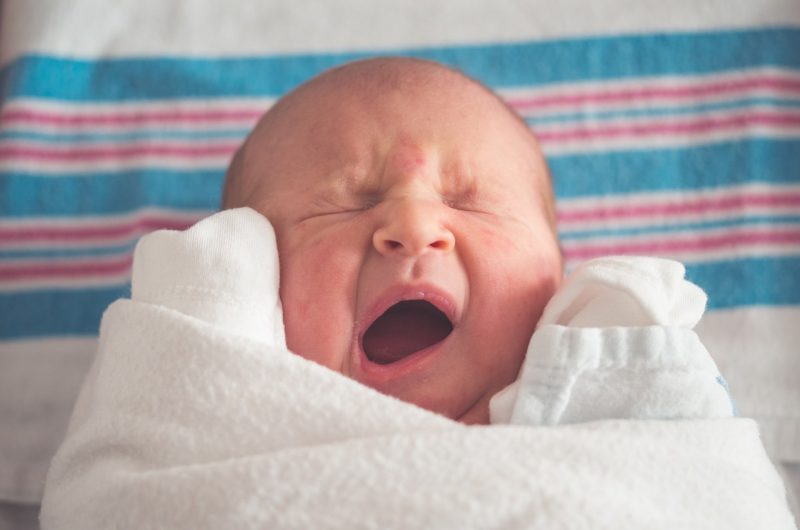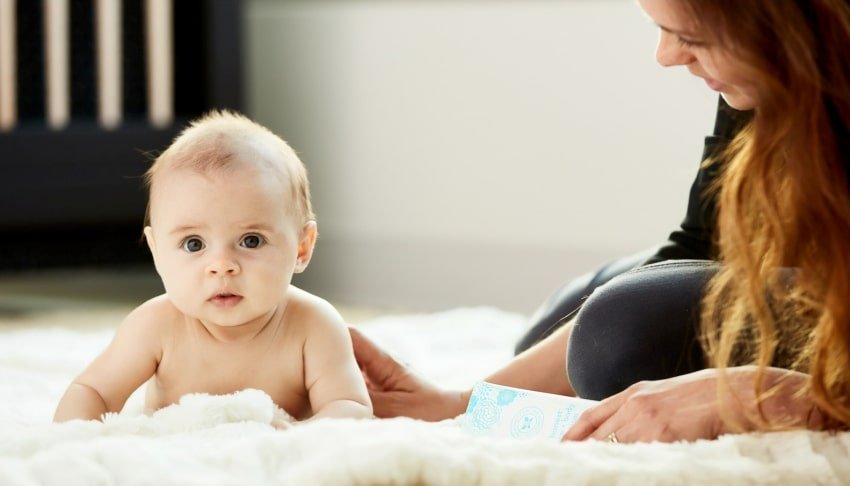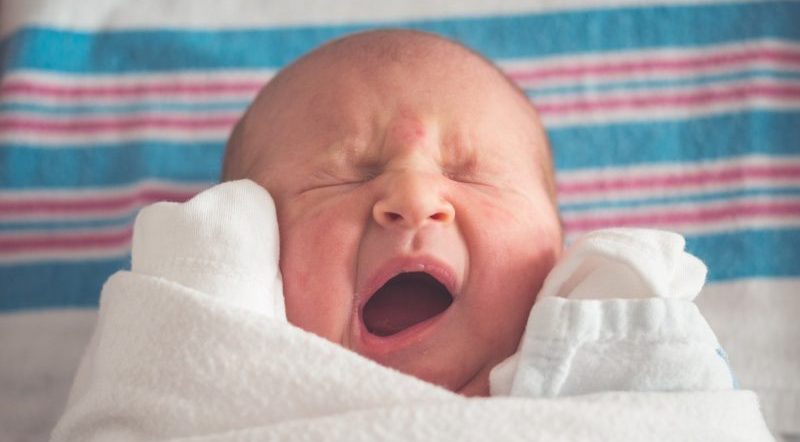As a mother, one of the things you may be wondering about is why your baby is shaking their head. Babies do this for various reasons.
Sometimes, my grandson does it when he’s hungry. He has also started sucking his thumb, so he does it when he’s trying to find his thumb.
Newborn babies do this in an attempt to find a nipple. It is called the rooting reflex. They are usually hungry or would like something to suck on, like a pacifier.
Different babies do this for other reasons though. Determining what’s going on with your baby and paying attention to the details is key to figuring out why your baby is shaking their head.
Baby Shaking Head (Rooting Reflex)
Newborn babies have what is called the rooting reflex. Most babies are born with this to help them successfully breastfeed.
Take the crook of your finger and touch your baby’s cheek near their mouth. When your baby turns their head to suck, this is called the rooting reflex. Sometimes it is described as the baby rooting for a nipple. This can make your baby shake their head while they are feeding or hungry.
Baby Shaking Head When Hungry
Because of their rooting reflex, it is common for babies to shake their heads when they are hungry. Your baby might shake their head in an attempt to find a nipple, or if they need something to suck on, like a pacifier.
Perhaps this BIBS rubber pacifier will help them stop their head-shaking by giving them something to suck on.
[amalinkspro type=”showcase” asin=”B07TD6VNML” apilink=”https://www.amazon.com/dp/B07TD6VNML?tag=mominformedcom-20&linkCode=osi&th=1&psc=1″ new-window=”true” addtocart=”false” nofollow=”true” sc-id=”4″ imgs=”LargeImage” link-imgs=”false” specs=”A favorite for both moms and babies for over forty years, the bibs natural rubber baby pacifier allows your child to self-soothe by exercising their instinctive sucking instinct in the most natural way possible, by mimicking both the shape and soft materials of mothers’ breast. Their classic appearance captures a look that’s both timeless and elegant.~~~Pack of 2 Pacifiers in size 1 which is the suitable for ages 0-6 Months.~~~100% free from BPA, PVC and phthalates.~~~Designed and manufactured in Denmark. Pacifiers may have an engraved or raised logo on the ring.~~~” btn-color=”#ff9900″ btn-text=”Buy on Amazon” alignment=”aligncenter” hide-prime=”0″ hide-image=”0″ hide-reviews=”0″ hide-price=”0″ hide-button=”0″ width=”750″]BIBS BPA-Free Natural Rubber Baby Pacifier[/amalinkspro]
Babies that have the rooting reflex do not only display this behavior when you touch their cheek.
Baby Shaking Head When Tired
View in gallery
Babies shake their heads for all kinds of reasons. One of the reasons is that they like to move because it is soothing.
When a baby is tired, they could be shaking their head to help themselves fall asleep. Babies will do this as a way to rock themselves to sleep, or because it makes them a little dizzy, which helps them fall asleep.
Some babies might also do this because they are looking for a pacifier to help them fall asleep.
Baby Shaking Head While Breastfeeding
If your baby is shaking their head while breastfeeding, they are trying to latch on better. This is what the rooting reflex is actually for. Babies do this before latching onto the nipple.
It’s extremely common for newborn babies to shake their head while breastfeeding, but sometimes babies are a little late to develop this reflex. This can result in your baby not doing this for a month, and then they will suddenly start shaking their head.
Related Article: Why Does My Babys Leg Shake?
Baby Shaking Head Due To Autism
Sometimes, babies can shake their head for a more concerning reason, such as autism. A baby shaking their head is not enough to diagnose autism, but it is one of the symptoms.
Children that have autism appreciate a rhythmic motion. Older children with autism are known for rocking back and forth. Babies are known for shaking their heads. If your baby is shaking their head due to autism, they will show a few other symptoms as well.
Autism comes with quite a few different symptoms. Most children with autism will experience one or more of these signs. If you notice that your little one has several of them, it’s time to call the doctor for a proper evaluation.
Avoids Eye Contact
Children and babies that have autism tend to avoid eye contact. If you talk to your baby and they don’t look you in your eye, this could be a sign of autism. Babies might get distracted and do this periodically if they are paying attention to something else, but a baby with autism will do it most of the time.
View in gallery
Does Not Like To Be Touched
Some children with autism do not like to be held or cuddled. These babies can be restless, and will not snuggle you when you pick them up.
I used to work at a daycare with a toddler that was autistic. This was the only kid that no one could hug or pick up. Her mother said that she had been like that since she was born, and she would have a meltdown if you tried to pick her up.
Developmental Delays
As babies get older, they become more responsive. They look at you when you say their name and they follow objects with their eyes when you hold them in front of their face and move them.
Children with autism often do not do either of these things. Instead, they don’t seem to hear from you. Babies with autism don’t seem to notice when you move objects in front of their eyes either.
Do Not Use Gestures
As babies grow, they pick up on certain gestures. They learn to wave bye-bye when they are leaving. Babies also pick up on pointing at objects that they want. If your baby does not use hand gestures at an appropriate age, that’s a huge red flag.
Not Affectionate
If your baby has autism, they might not show signs of affection. Instead of hugging you back, they may remain limp in your arms.
When you try to cuddle with them, you might find that they do not cuddle back with you. Instead, they simply sit there. You are not likely to get kisses out of an autistic child either.
Not Responsive To Sounds
Babies with autism are significantly less responsive to sounds than other babies. When they hear a familiar voice, they might not turn their head to look at the person. They also are less likely to respond to voices or sounds in general.
Older babies will turn their heads or start exploring to determine where a noise is coming from whereas babies with autism will not.
Does Your Baby Play Alone?
All children should be able to entertain themselves, but autistic children could play alone for hours. These children might not prefer your company, and they might not be a fan of playing with other children at all.
Watch for this sign of autism in older children. You might notice when there are babies that do not play with other children, and they never start.
Multiple Symptoms
When a child has autism, they will show more than just one symptom. This can make an autism diagnosis a tad complicated. For example, a baby might like rhythmic motions, but this could also be a form of self-soothing because they are tired.
A baby also might never grow interested in playing with other children because they need intervention to work on social skills.
If your baby is displaying one or two symptoms, it is usually not a reason for concern. However, you should still discuss this with their pediatrician.
A pediatrician can point you in the direction of intervention programs that can help your baby develop the skills they need. They can also keep an eye out for other symptoms of autism.
View in gallery
Why Is My Baby Shaking Their Head?
Your baby is more than likely shaking his head because he is hungry or to soothe himself into a peaceful sleep. It’s normal for babies to shake their heads during periods of stress to calm themselves down too.
Here is a quick summary as to why your baby is their shaking head:
- Hungry
- Stressed
- Autism
- Self Soothing
- Tired
- Rooting Reflex
- To Help Themselves Latch On
Other conditions, such as Shudder Syndrome, may also cause a baby to shake their head. While these are less common, they are a possibility.
When To Call The Doctor
If your baby is shaking their head, look for clues as to what might be causing it. Pay attention to what is happening around them when they are shaking their head. It can be helpful to document this behavior to keep track of when your baby is displaying this behavior.
A careful review of your records can help you determine if it is only when they are hungry, tired, etc.
If your baby is shaking their head and it is not due to them being hungry or tired, contact your pediatrician. It could be a normal part of self-soothing, or it could be something else. It’s always best to call your pediatrician if you are concerned just in case.
Remember, it’s better to be safe than sorry.
Your pediatrician can also help you and your little one with early intervention strategies if necessary. If the baby shaking head is due to autism, early intervention can help him learn the skills that he needs to function in school.
Your doctor can show you how to teach your little one social skills, for example, something that most children with autism need assistance with.
Medical Disclaimer. All content and media on the Mom Informed Website is created and published online for informational purposes only. It is not intended to be a substitute for professional medical advice and should not be relied on as health or personal advice.







